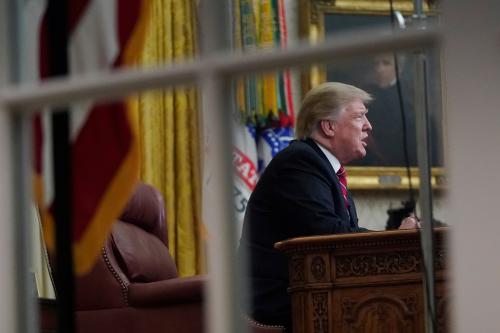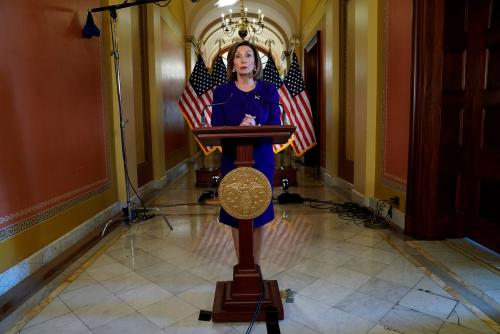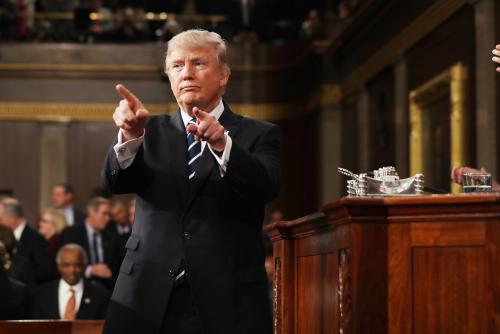Following the Senate’s resolution of disapproval of the emergency declaration to build a southern border wall, Brookings scholars had differing opinions on what it will mean for President Trump. In addition to what Elaine Kamarck writes below, you can read a separate piece by John Hudak arguing that this does little to hurt the president.
The Senate vote overturning President Trump’s emergency declaration brings him closer to impeachment. Twelve Republicans joined every Democrat in standing up to their president on this issue—many more than had been expected even a week ago. It is the movement of Republicans that makes impeachment possible.
Impeachment is, and frankly has always been, in the hands of the Republicans—not the Democratic Party. This week Speaker Nancy Pelosi said clearly what most people have known for some time now: Democrats will not go it alone in impeaching Trump because an act that serious must be bipartisan. Although investigations will continue and articles of impeachment may be drawn up, a substantial number of Republicans will need to move before the Democrats begin the process by bringing charges to the floor of the House.
Conventional wisdom has maintained that Trump is safe from impeachment because Republicans will never abandon him, as my colleague John Hudak argues. But there are, and have been, ominous signs to the contrary from the very beginning of the Trump Administration. In the summer of 2017, both Republican-controlled houses of Congress passed a Russia sanctions bill by overwhelming margins (419 to 3 in the House and 97 to 2 in the Senate). The bill placed unprecedented restrictions on a president’s ability to lift sanctions that had been placed on other countries and was clearly a pre-emptive strike against a president whose administration began under a cloud of suspicion over Russian interference in the 2016 election. Trump opposed the bill, but the margins were so big he opted not veto it to avoid the embarrassment of a certain override.
The next snub also came later that summer. After unsuccessfully voting more than 60 times to repeal Obamacare, a Republican-controlled Congress and White House failed to make it happen. When the bill got to the Senate, three Republican senators refused to go along, resulting in a second poke in the eye for the president.
Standing up to Trump on health care turned out to have few consequences. Twenty House Republicans voted against the 2017 GOP bill to repeal and replace Obamacare. Six of those House members decided not to run again. But of those who did run, nine won re-election and four lost their races.
Trump’s reaction to these setbacks was characteristic of a man who has few friends and who relishes making enemies. After the Senate failed to pass his Obamacare replacement, Trump took to Twitter to denounce them as “fools” and “total quitters.” That could not have gone over well with the senators who opposed him along the way. And interestingly, they did not care.
The following summer, Trump held a summit with Russian President Vladimir Putin, followed by a humiliating press conference at which the President of the United States appeared to play lap dog to a Russian dictator. By my count at the time, 14 Republican Senators condemned Trump specifically in their statements and only 2 supported him. Going into the fall of 2018 there were about 14 Republican Senators willing to cross swords with the president; two declined to run again and one, Senator John McCain (R-AZ) died.
In January of this year, the Senate voted “To express the sense of the Senate that the United States faces continuing threats from terrorist groups operating in Syria and Afghanistan and that the precipitous withdrawal of United States forces from either country could put at risk hard-won gains and United States national security.” This vote was a direct rebuke in response to Trump’s abrupt call for troop withdrawals and it passed 68 to 23; 7 Republican Senators sat it out and didn’t vote, 2 voted with the president but the remaining Republicans voted on a resolution directly contradicting presidential policy.
As my colleague John Hudak points out in a companion piece, talk of impeachment is unrealistic given Trump’s standing among his fellow Republicans. But, Hudak’s take is too focused on the present. As Republican Senators get accustomed to contradicting Trump and discover that there are no negative consequences, a Mueller report containing serious evidence of presidential wrongdoing might lead them to believe that they can go against him. Conviction in the Senate will require only 20 Republican desertions, and every one of these legislative rebukes should worry the president and ensure the White House keeps count.
The Brookings Institution is committed to quality, independence, and impact.
We are supported by a diverse array of funders. In line with our values and policies, each Brookings publication represents the sole views of its author(s).









Commentary
The Senate vote on the wall brought Trump closer to impeachment
March 15, 2019